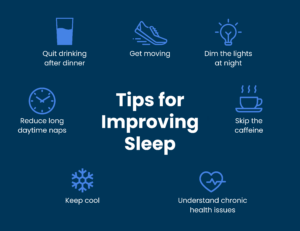The most basic definition of sleep hygiene means a set of habits a person has which allows them to have good sleep brian’s. It can be now understood that practicing basic sleep hygiene optimally will improve one’s resting pattern and consequently, one’s physical as well as mental well-being. Hence, proper sleep hygiene is pertinent for any individual with sleep disturbances including insomnia, different sleep patterns, and or just someone trying to improve their sleep. Here are a couple of good sleep hygiene techniques that you can try for better quality sleep.
Pick and Stick to a Sleep Schedule
The most common strategy in improving sleep quality is having a sleep schedule that you adhere to. According to sleep experts it is best practice to fall asleep for the same amount of time on a regular basis, even if it is the weekend. And so this leads to simply being noted that as easy as A B C, but this is one of the most difficult areas for an individual. When an individual goes to bed and wakes up at the set times, it focuses on recreating the body’s internal clock (the circadian cycle). Thus, by following a rhythm in sleep, the body gradually learns itself the right time for going to bed, and the right time to wake up thereby emphasizing on a proper transition vividly from being an active individual to a resting entity.
Try to average between seven to nine hours of sleep a night, taking your specifics into account as everyone has personalized sleeping needs. Waking up feeling dazed after a night’s rest or getting an afternoon slump means one thing, you’re not sleeping much . Try and make attempts at sticking to a sleep schedule as it significantly provides a sense of structure while allowing you to wake up more rejuvenated.
Settle Down With a Good Routine Before Sleeping
An effective way of alerting your body that it is sleep time, is by making modifications to your habits prior to resting. Include activities such as, reading a book, a warm bath, deep breathing or meditating before sleeping as these functions can allow the body to gradually transition from wakefulness to rest. Make sure not to engage in workouts, chores or even electronics right before sleeping as these alter the state of your awareness and make it difficult to doze off.
There’s a reason why therapists recommend rituals; incorporating them into your sleeping habit has a tendency of relaxing both your mind and body. The more you perform these ‘rituals’ the easier it gets to relax and sleep as your mind is conditioned that way.
Limit Exposure to Screens Before Bed
Did you know that devices such as phones, tablets, and laptops emit blue light? Research indicates that this type of light hinders melatonin production, making it more difficult to sleep. Using screens close to sleeping time sends mixed signals to the brain and creates the illusion that it is still daytime. As a result, you end up struggling to sleep as well.
In order to improve sleep quality, try to refrain from using screens for 30-60 minutes before bed. Instead, try reading a book, or listening to music that is not upbeat. This way, your body would actively engage in its natural sleeping mechanism and it would be far more effective in achieving the desired state.
Make Your Sleep Environment Comfortable
The reason why this statement is true is that one can feel uncomfortable in warm places the same way they would feel uncomfortable in cold places, which is why a relaxing setting is essential for a good night’s sleep. Dress your bed with a temperature-regulating duvet, blackout curtains, soundproof windows. Additionally, make sure to buy physical bedding that promotes healthy sleeping patterns, such as a comfortable mattress and good pillows.
Emotional situations can frustrate us to the point that entirely reversing the causes of aggression and irritation can seem unreasonable or impossible…In such situations you can always consider using earplugs, blinds or a white noise machine. If your sleeping environment is favorable you would fall asleep easily and remain in slumber for most of the time.
Do not Consume Stimulants and Heavy Meals Before Going to Bed
There are obviously certain substances that hinder sleep patterns in people. Caffeine and nicotine are two stimulants that invades a person’s body system and keeps them alert and uneasy to sleep for awful long hours. It is the best practice to not intake these substances 2 to three hours prior going to bed.
Getting up to this idea, having a properly large meal before going to bed, would be pretty close to impossible, because most of the foods people eat before bedtime are quite heavy or spicy, which causes people to have nausea and indigestion. In case of feeling hungry before bedtime, one can indulge in some healthy and sleeping inducing snacks such as nuts and fruits. In order for one to digest food properly it would be best to eat a large meal at least 2 hours prior sleeping.
Stick to Exercising Regularly, But Not Right Before Sleeping
Exercising is a great way of improving one’s sleep quality and aids in deeper and better sleep. However, sleeping and exercising too closely around the same time is not recommended as exercising can suppress the sleep urge. People who enjoy working out late in the evening should be careful not to do any vigorous workouts too close to bedtime.
If one truly needs to carry out strenuous workouts, make sure there is a gap of at least 3 hours between the exercise and your sleep time allowing your body to cool down. Late night yoga and stretching are great alternatives that one can indulge themselves in after having completed the workouts earlier in the day.
Stressing Less Offers More Rest
Our stress and anxiety can be the primary reasons why we are unable to fall or stay asleep, Alongside these, several relaxation techniques such as progressive muscle relaxation can make it easy to sleep as they lower the levels of stress. People reporting issues with sleep regularly should also consider writing their thoughts out in a journal or a paper right before going to bed which can remedy that issue and clear your mind.
By carrying out these activities during the course of the day and night one will be able to get better sleep and have a more refreshing next day.
Minimize Daytime Naps
While dainty snoozes can be revitalizing, prolonged or afternoon siestas tend to disrupt sleep in the night. If you have to doze off during the day, try to keep it short, not in excess of half an hour, and that too early in the day. This allows the body to accumulate enough sleep pressure for deeper sleep at night.
Incorporate more Daylight in your Routine
Day exposure to natural daylight helps in the maintenance of the circadian cycle and improves the sleep-wake cycle of the body. It is advisable to go out when the sun is out but that’s easily said than done. Direct sun exposure also allows for the resetting of the body clock and helps in melatonin secretion when it’s bedtime.
For those of you who cannot sunbathe at all, consider a light therapy box, which is designed to simulate real daylight. This is particularly helpful to those who work family affected/alem with seasonally working in offices or for distant relatives.
Set Apart Your Bed For Sleep And Rest
In order to associate your bed with sleep, make sure that you use your bed solely for sleeping and resting. This means you should refrain from using it for any purposes such as working, watching TV or looking at your phone. Doing so will allow your brain to link your bed with the act of sleeping which will make it easier for you to fall asleep once you lie down in bed. For instance if you are waiting in bed and unable to fall asleep let’s say for more than 20 minutes, don’t just continue lying in bed. Feel free to get out, do anything relaxing until you start to feel tired and return to bed.
Final Perspective
Good sleeping habits will allow you built a culture and new practices which will make sure that you sleep in peace and maximum quality. Maintaining sleep hygiene is essential for enhancing not only physical aspects but also mental health, mood, and work efficiency as well. Try to maintain discipline as this is the main ingredient in molding these habits to your everyday life which will help you in the long run in developing a stronger sleep pattern. Good sleeping practices should not be taken lightly, as they can help people who require a better sleep, or help those who do not have proper sleeping patterns.




